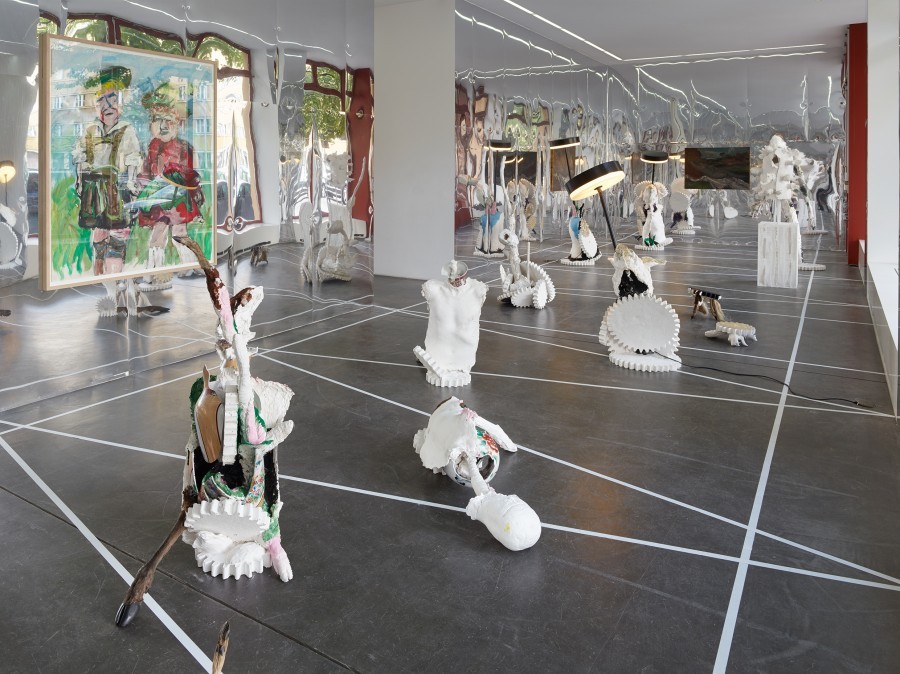Stephan Dillemuth
13 Sep - 08 Nov 2017
STEPHAN DILLEMUTH
13 September — 8 November 2017
In his exhibition Stephan Dillemuth shows recent sculptures and early paintings from 1979 and 1984.
Bayernbub and Bayernpaar originate from Dillemuth’s first exhibitions in 1979. Their motives derive from souvenir postcards that are transferred to the canvas by painterly, expressive gesture. Low is replaced by High. For the “copied” postcards on canvas, the works titled Damen of 1984, Dillemuth uses cheap industrial colors, masterworks copied with poor materials.
Both groups of works illustrate idealized bodies, folklore, female nudes. Both mirror the critique of art as apparent reversal of indefinite usability. Dillemuth reverses values and apparent values. Pro- cesses of exchange are economic processes of exchange. Economic processes of exchange are always physical processes of exchange, processes of exchange between humans, animals and machines, between the lively and its organized exploitation. The gear serves as universal metaphor for the latter. In Dillemuth’s most recent sculptures it is blended with fragments of hu- mans, animals and culture (casts of the artist’s head and hands, animal paws and pigs’ heads, decorated vases or lamps of modernist design – kitsch and style), forming breathtaking ugly-beauti- ful sculptures. Sculptures that appear as liquidly painted.
Through the presentation, this liquefaction is expanded into infinity. As in the mirror cabinets of the rococo style, space and and the representation of power are extended into infinity (into virtuality). In the mirror foil covered space, the paintings and sculptures throw waves into all directions. In these painterly sculptures, painting manifests itself as resistant, second common thread in Stephan Dillemuth’s oeuvre. It is, also in the three-dimensional space, a radical painting practice that expe- rienced and withstood the stress test of substance-critical discourses of the 1990s that Dillemuth himself strongly influenced.
13 September — 8 November 2017
In his exhibition Stephan Dillemuth shows recent sculptures and early paintings from 1979 and 1984.
Bayernbub and Bayernpaar originate from Dillemuth’s first exhibitions in 1979. Their motives derive from souvenir postcards that are transferred to the canvas by painterly, expressive gesture. Low is replaced by High. For the “copied” postcards on canvas, the works titled Damen of 1984, Dillemuth uses cheap industrial colors, masterworks copied with poor materials.
Both groups of works illustrate idealized bodies, folklore, female nudes. Both mirror the critique of art as apparent reversal of indefinite usability. Dillemuth reverses values and apparent values. Pro- cesses of exchange are economic processes of exchange. Economic processes of exchange are always physical processes of exchange, processes of exchange between humans, animals and machines, between the lively and its organized exploitation. The gear serves as universal metaphor for the latter. In Dillemuth’s most recent sculptures it is blended with fragments of hu- mans, animals and culture (casts of the artist’s head and hands, animal paws and pigs’ heads, decorated vases or lamps of modernist design – kitsch and style), forming breathtaking ugly-beauti- ful sculptures. Sculptures that appear as liquidly painted.
Through the presentation, this liquefaction is expanded into infinity. As in the mirror cabinets of the rococo style, space and and the representation of power are extended into infinity (into virtuality). In the mirror foil covered space, the paintings and sculptures throw waves into all directions. In these painterly sculptures, painting manifests itself as resistant, second common thread in Stephan Dillemuth’s oeuvre. It is, also in the three-dimensional space, a radical painting practice that expe- rienced and withstood the stress test of substance-critical discourses of the 1990s that Dillemuth himself strongly influenced.

